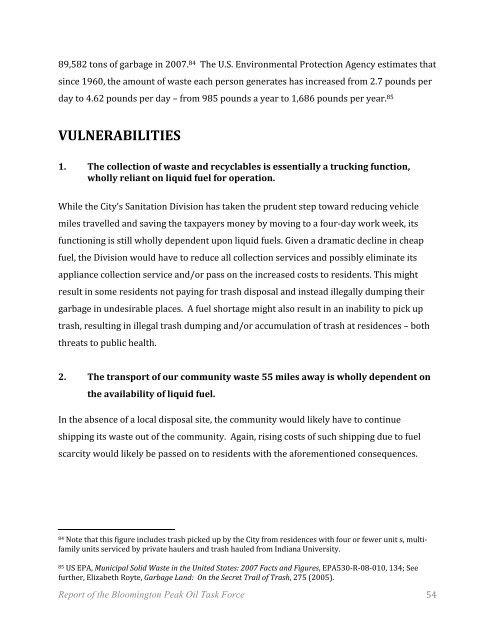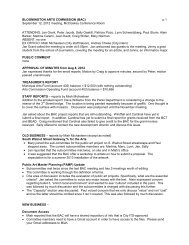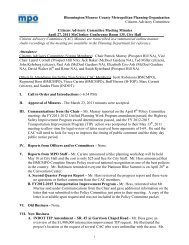Peak Oil Task Force Report - City of Bloomington - State of Indiana
Peak Oil Task Force Report - City of Bloomington - State of Indiana
Peak Oil Task Force Report - City of Bloomington - State of Indiana
You also want an ePaper? Increase the reach of your titles
YUMPU automatically turns print PDFs into web optimized ePapers that Google loves.
89,582 tons <strong>of</strong> garbage in 2007. 84 The U.S. Environmental Protection Agency estimates that<br />
since 1960, the amount <strong>of</strong> waste each person generates has increased from 2.7 pounds per<br />
day to 4.62 pounds per day – from 985 pounds a year to 1,686 pounds per year. 85<br />
VULNERABILITIES<br />
1. The collection <strong>of</strong> waste and recyclables is essentially a trucking function,<br />
wholly reliant on liquid fuel for operation.<br />
While the <strong>City</strong>’s Sanitation Division has taken the prudent step toward reducing vehicle<br />
miles travelled and saving the taxpayers money by moving to a four‐day work week, its<br />
functioning is still wholly dependent upon liquid fuels. Given a dramatic decline in cheap<br />
fuel, the Division would have to reduce all collection services and possibly eliminate its<br />
appliance collection service and/or pass on the increased costs to residents. This might<br />
result in some residents not paying for trash disposal and instead illegally dumping their<br />
garbage in undesirable places. A fuel shortage might also result in an inability to pick up<br />
trash, resulting in illegal trash dumping and/or accumulation <strong>of</strong> trash at residences – both<br />
threats to public health.<br />
2. The transport <strong>of</strong> our community waste 55 miles away is wholly dependent on<br />
the availability <strong>of</strong> liquid fuel.<br />
In the absence <strong>of</strong> a local disposal site, the community would likely have to continue<br />
shipping its waste out <strong>of</strong> the community. Again, rising costs <strong>of</strong> such shipping due to fuel<br />
scarcity would likely be passed on to residents with the aforementioned consequences.<br />
84 Note that this figure includes trash picked up by the <strong>City</strong> from residences with four or fewer unit s, multi‐<br />
family units serviced by private haulers and trash hauled from <strong>Indiana</strong> University.<br />
85 US EPA, Municipal Solid Waste in the United <strong>State</strong>s: 2007 Facts and Figures, EPA530‐R‐08‐010, 134; See<br />
further, Elizabeth Royte, Garbage Land: On the Secret Trail <strong>of</strong> Trash, 275 (2005).<br />
<strong>Report</strong> <strong>of</strong> the <strong>Bloomington</strong> <strong>Peak</strong> <strong>Oil</strong> <strong>Task</strong> <strong>Force</strong><br />
54









